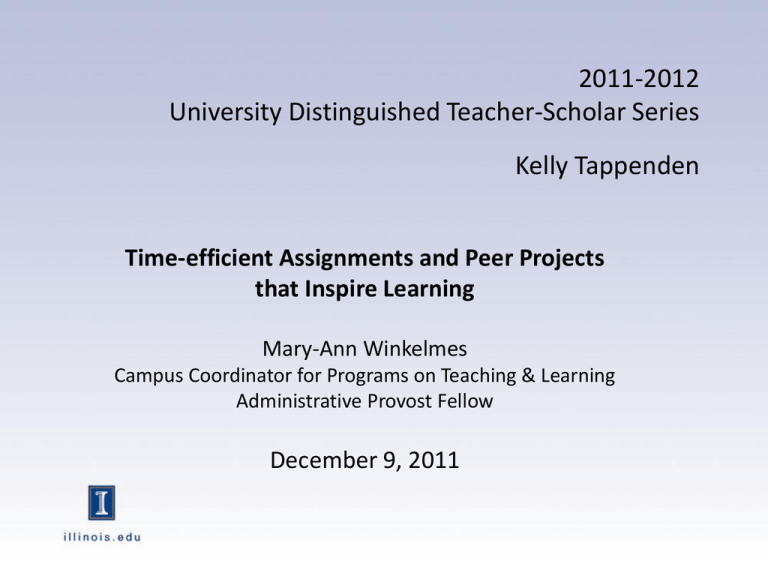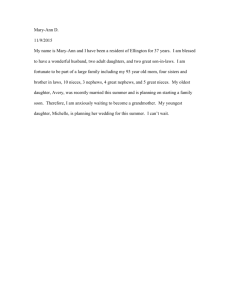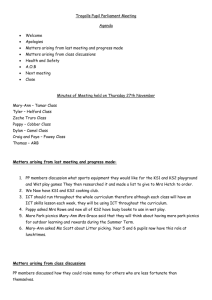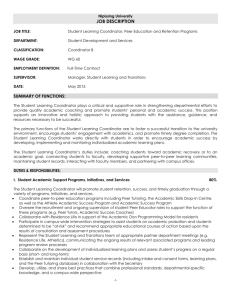Powerpoint Slides
advertisement

2011-2012 University Distinguished Teacher-Scholar Series Kelly Tappenden Time-efficient Assignments and Peer Projects that Inspire Learning Mary-Ann Winkelmes Campus Coordinator for Programs on Teaching & Learning Administrative Provost Fellow December 9, 2011 Team-Based Learning (TBL) Stephanie Ceman, PhD College of Medicine Cell and Developmental Biology Neuroscience Program Mary-Ann Winkelmes Campus Coordinator for Programs on Teaching & Learning 12/9/11 2011-2012 Distinguished Teacher-Scholar Discussion Board • 121 hits • Peer instruction contexts: • In the classroom • Service learning in the community • • GLSIS Community as Curriculum mentoring in music education • Online, virtual groups: Piazza, Moodle Mary-Ann Winkelmes Campus Coordinator for Programs on Teaching & Learning 12/9/11 2011-2012 Distinguished Teacher-Scholar Discussion Board • Peer instruction methods • Simulations • Commercial transactions • Bloodwork analysis • Cases • Problem-solving (sometimes w/intro mini-lecture) • • • • • Biology Political Science Music Engineering Math Mary-Ann Winkelmes Campus Coordinator for Programs on Teaching & Learning 12/9/11 Links to syllabi Assignment descriptio Mary-Ann Winkelmes Campus Coordinator for Programs on Teaching & Learning 12/9/11 Email contacts Peer instruction: Design Principles A collaborative exercise is likely to succeed when the teacher has a satisfying answer for him/herself to each of these three questions, and when s/he tells students explicitly in advance how each of these three will benefit the students’ learning: What is the … Purpose Process Product [3 p’s for Peer learning] Mary-Ann Winkelmes Campus Coordinator for Programs on Teaching & Learning 12/9/11 Illinois Faculty Responses: Challenges and Successes Please identify any challenges or What are the key characteristics of barriers to Illinois students' successful assignments that you have found to be completion of assignments effective in your work with Illinois students? Discomfort applying new knowledge Apply class concepts to new situations during class Lack of critical thinking skills In class (with peers) practice in higher order thinking Scattered focus Procrastination Structured, relevant assignments Staged assgts connected w/exams, projects Explicit rubrics, annotated examples Lack of models Ambiguous rubrics / success standards Inadequate time for prof’s quality feedback Peer feedback (structured) in/out of class Engagement (w/assgt, resources) Relevance Mary-Ann Winkelmes Campus Coordinator to students’ experience, for Programs on Teaching & Learning Oppty to make a new contribution 12/9/11 Research on Learning / Implications for Assignments Publication Implication Peter Elbow, Low stakes for greater creativity / risk Jaschik/Davidson Richard Light Coaching model, peer instruction Anthony Gregorc, Kolb 3 Varied format, equitable access, peer ins. Treisman, (Steele) Offer/demand peer study groups Nakamura/Winkelmes 4 Flexible format 5 Benjamin Bloom 6 Sequence skill development Colomb, Bass 7, 8, 9 Feedback on Content vs. Format, try again Provide examples with criteria applied Perry , etc. 10, Winkelmes Felder 11-15 Doyle Target feedback to phase; Don’t overwhelm Specify content goals; skills goals; criteria to enable self-monitoring Mary-Ann Winkelmes Campus Coordinator for Programs on Teaching & Learning 12/9/11 Most effective modes of transparency for highest future learning benefits • explicitly connecting data about how people learn with course activities at difficult transition points (p < .001) • assignments' learning goals and design rationale are identified and discussed before students begin each assignment (p < .001) • in-class debriefing discussions about graded tests and assignments (p < .010) • grading practices and criteria defined and discussed, with opportunities for students to apply them (p < .029) One-way ANOVA followed by Games-Howell multiple comparisons test Mary-Ann Winkelmes Campus Coordinator for Programs on Teaching & Learning 12/9/11 Ongoing Transparency Research Variables: • Discipline • Course level • Previous educational experience • Self-declared ethnicity • Self-declared major • Which “modes” benefit which learning goals www.teachingandlearning.illinois.edu Mary-Ann Winkelmes Campus Coordinator for Programs on Teaching & Learning 12/9/11 “Research” Sample Assignments • What implications from research are incorporated? • What additional good ideas do you see? • What change(s) might you recommend? Mary-Ann Winkelmes Campus Coordinator for Programs on Teaching & Learning 12/9/11 Peer Learning Exercise Purpose: Experience small group, low stakes, +/- to replicate Process: what needs further explanation? Product: 1) list of skill in sequence 2) feasible plan for course assignments • 6 minutes • Groups of 3 from different disciplines / departments – One person describes “A” final project – Partners ID and break down skills – List skills in sequence Mary-Ann Winkelmes Campus Coordinator for Programs on Teaching & Learning 12/9/11 Acknowledgments Scott Ahlgren John Abelson Lawrence Angrave Carol Augspurger Anne Barger Rohit Bharghava Jake Bowers Chip Bruce Stephanie Ceman Karen Flynn LAS Eng Eng LAS Vet Med Eng LAS GSLIS Med LAS Kate Kuper FAA Rick Laugeson LAS Michael Loui Eng Areli Marina FAA Beth Morgan LAS Tracy Parish Pub.Engagmt Shameem Rakha GSLIS Amy Santos Ed Nina Tarr Law Kelly Tappenden ACES Mary-Ann Winkelmes Campus Coordinator for Programs on Teaching & Learning 12/9/11 Course Assignments 1st: Prof-resp 2d: peer-resp in class? 3d: 4th: 1. Basic tools, data mastery 2. Application, analysis Prof-resp Peer-coached revision 3. Prof-resp Evaluation 4. Invent, create original contribution Mary-Ann Winkelmes Campus Coordinator for Programs on Teaching & Learning 12/9/11




